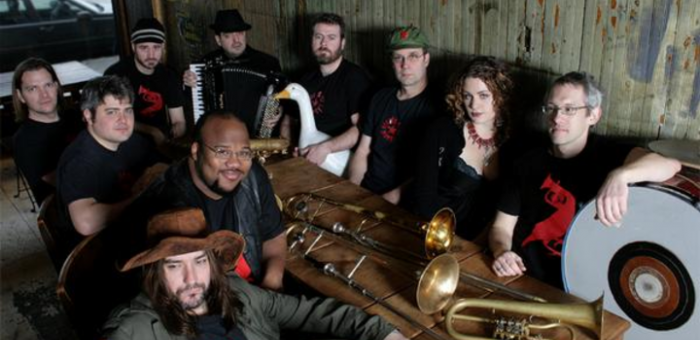Jan 13, 2026 2:09 PM
More Trump-Kennedy Center Cancellations
The fallout from the renaming of the John F. Kennedy Center for the Performing Arts to include President Donald…

Slavic Soul Party, led by Matt Moran (right, with bass drum), performed at the DC Jazz Festival on June 16.
(Photo: Courtesy of the artist)The Atlas Theater for the Performing Arts, in conjunction with this year’s annual DC Jazz Festival, hosted a rowdy, raucous Balkan Second Line-meets-Ellington celebration. The Brooklyn-based Slavic Soul Party’s presentation of Duke Ellington’s Far East Suite was chock full of fun. Band leader and bass drummer Matt Moran and his Serbian nonet have created a unique and successful stylistic fusion of two seemingly disparate forms—traditional Balkan brass band and mature, refined Ellingtonia.
As it has been previously noted, this Ellington-Strayhorn work could more accurately have been called “The Near East Suite,” as it contains only one composition, “Ad Lib On Nippon,” with a reference to a country in the “Far East.” The rest of the songs were inspired by some of the “Near East” locations visited by the Ellington Orchestra during its 1963 State Department tour which included stops in India, Iran, Lebanon, Turkey, Pakistan and Yemen.
Moran, playing a Serbian bass drum, or goc’ (pronounced “goach”), topped with a small cymbal, set the rhythmic drive for the group by pounding the right side with a mallet and a contrasting tap with a thin metal rod on the left, which he also used on the cymbal. He is the band’s principal arranger and raconteur, providing interesting facts with thoughtful, humorous commentary about each section of the suite in a most appealing manner, quipping that sending Ellington’s orchestra on tour was “the best decision the Department of State has ever made!”
Chris Stromquist was the other percussionist on snare drum, and his staccato taps contrasted nicely with Moran’s booming beats. Rounding out the rhythm section was Don Godwin on sousaphone, who blew a sturdy accompaniment that effectively undergirded the melodies. The other members of the group were John Carlson and Kenny Warren on trumpets, Tim Vaughn on trombone, Peter Hess on reeds (alto and baritone saxophones and clarinet) and Peter Stan on accordion.
“The Far East Suite is a masterpiece of composition and orchestration,” said Moran. In this adaptation, Moran has created a modern re-imagining that reflects the yearning melancholia of the Balkan musical tradition and, in the manner of Ellington, one that highlights the individual talents of his band mates.
On the band’s version of “Isfahan,” named after a provincial capital city in Iran, Warren’s trumpet was the showcase instrument in place of the originally featured alto saxophone of Johnny Hodges. Moran observed that the song was actually written some months before the tour. The descending five-note figures are separated by languid, aching spaces of varying length with a tension and release that left the listener hanging in suspense.
“Depk” is the name of an Arabic folk dance and was played in a shuffle beat with shifting tempos accented by harmonica-like blasts from the accordion and the muscular lines of Vaughn. “Mount Harissa,” named after a mountain in Lebanon, is another of the suite’s most recognizable themes.
Throughout the show, Moran joyfully pranced around the front of the stage driving the band and engaging the audience. Several times, he executed a perfectly coordinated smash on the drum under his kicked up right leg. Near the end of the set, the leader asked audience members to shout out the instrument they most wanted to hear solo. The overwhelming choice was the accordion, which Moran must have predicted beforehand, as it was indeed featured on the next selection, “Agra,” the name of a village in northern India.
Stan’s delivery of surging, swooshing runs of cleanly fingered rapid-fire notes revealed a stunning command of the instrument. For this performance, the final two movements were played in reverse order. The lengthy “Ad Lib On Nippon,” inspired by Ellington’s tour of Japan in 1964, was introduced by Moran asking if anyone in the audience could name the most difficult section of the suite. The arrangement was well executed as it seamlessly conjoined its multiple sections with the sometimes-abrupt changes in tempo.
The closer was “Amad,” the name of a town in central Yemen. As the song began with a New Orleans street-band cadence, Moran exhorted audience members to “get up and dance!,” reminding them that this was, after all, a brass band show. It was an exuberant ending to a concert hosted by a band that really knows how to party. DB

Belá Fleck during an interview with Fredrika Whitfield on CNN.
Jan 13, 2026 2:09 PM
The fallout from the renaming of the John F. Kennedy Center for the Performing Arts to include President Donald…

Peplowski first came to prominence in legacy swing bands, including the final iteration of the Benny Goodman Orchestra, before beginning a solo career in the late 1980s.
Feb 3, 2026 12:10 AM
Ken Peplowski, a clarinetist and tenor saxophonist who straddled the worlds of traditional and modern jazz, died Feb. 2…

The success of Oregon’s first album, 1971’s Music Of Another Present Era, allowed Towner to establish a solo career.
Jan 19, 2026 5:02 PM
Ralph Towner, a guitarist and composer who blended multiple genres, including jazz — and throughout them all remained…

Rico’s Anti-Microbial Instrument Swab
Jan 19, 2026 2:48 PM
With this year’s NAMM Show right around the corner, we can look forward to plenty of new and innovative instruments…

Richie Beirach was particularly renowned for his approach to chromatic harmony, which he used to improvise reharmonizations of originals and standards.
Jan 27, 2026 11:19 AM
Richie Beirach, a pianist and composer who channeled a knowledge of modern classical music into his jazz practice,…